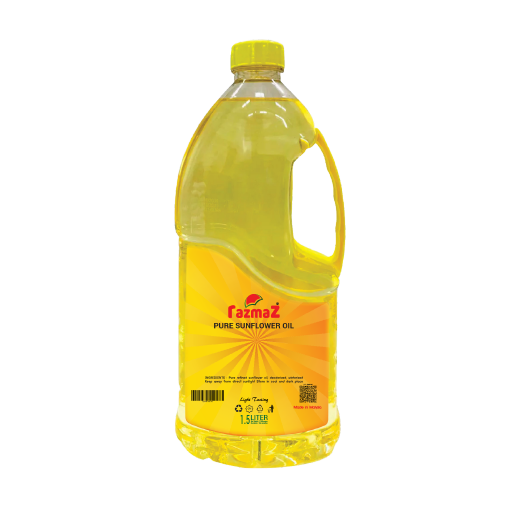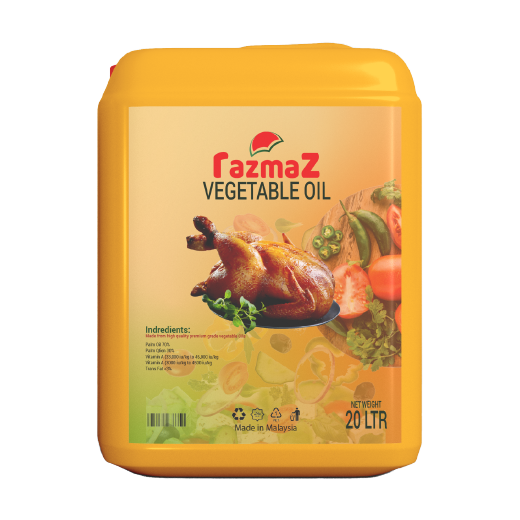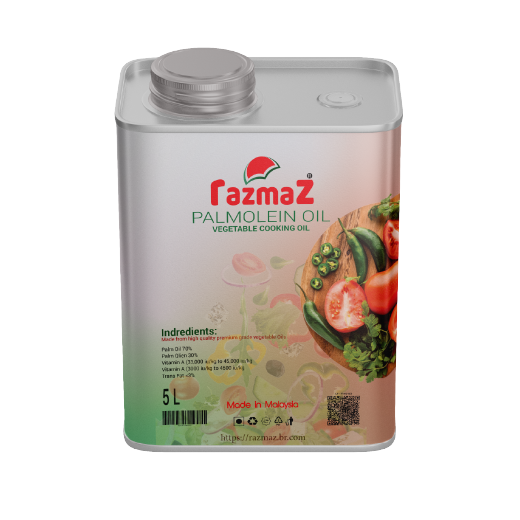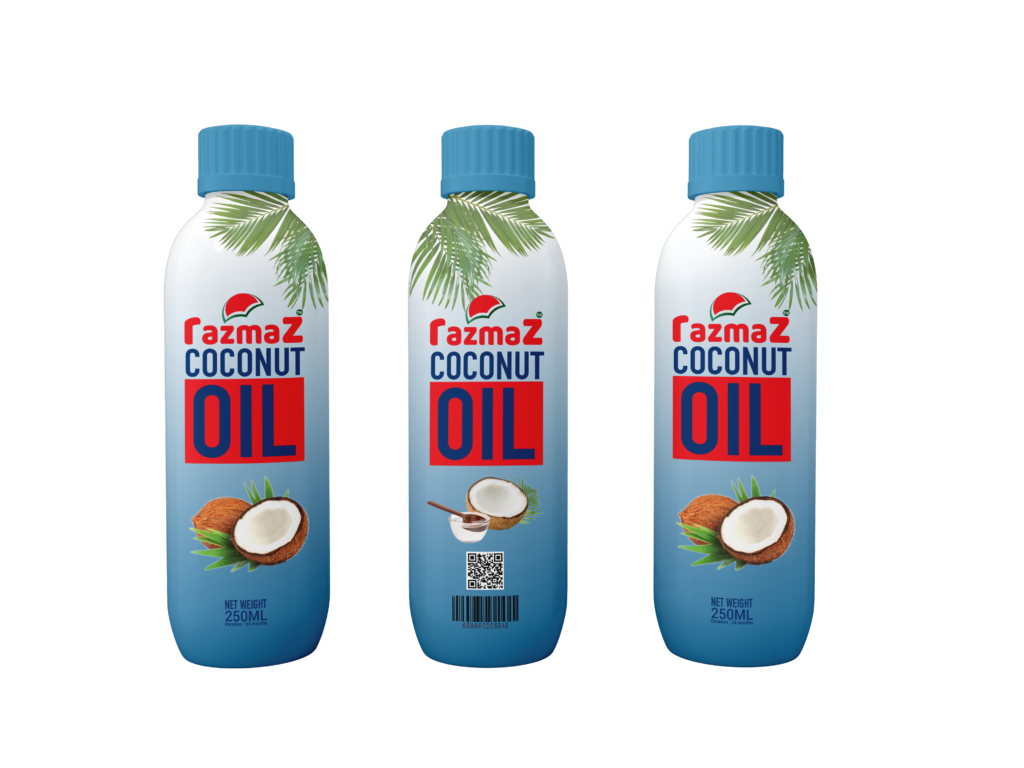
PURE SUNFLOWER OIL
Here’s a chart outlining the key nutritional and physical properties of sunflower oil (per 100 grams):
Parameter | Specification/Value |
|---|---|
| Product Name | Sunflower Oil |
| Calories | 884 kcal |
| Total Fat | 100 g |
| Saturated Fat | 10 g |
| Monounsaturated Fat | 46 g |
| Polyunsaturated Fat | 40 g |
| Omega-6 Fatty Acids | 40 g |
| Omega-3 Fatty Acids | Trace amounts |
| Cholesterol | 0 mg |
| Vitamin E | 41.1 mg (205% of RDI) |
| Vitamin K | 5.4 µg |
| Smoke Point | 232°C (450°F) |
| Density | 0.91 g/cm³ |
| Appearance | Clear, golden-yellow liquid |
| Odor and Taste | Neutral or slightly nutty |
Applications:
- Cooking: Ideal for frying, baking, and salad dressings due to its high smoke point.
- Health Benefits: Rich in Vitamin E and unsaturated fats, sunflower oil supports heart health and provides antioxidant benefits.
- Other Uses: Used in cosmetics, skincare, and industrial applications.
Sunflower oil is widely appreciated for its versatility, neutral flavor, and nutritional properties.
VEGETABLE OIL
Here is a general chart outlining the key nutritional and physical properties of vegetable oil (per 100 grams):
Parameter | Specification/Value |
|---|---|
| Product Name | Vegetable Oil |
| Calories | 884 kcal |
| Total Fat | 100 g |
| Saturated Fat | 14 g |
| Monounsaturated Fat | 65 g |
| Polyunsaturated Fat | 21 g |
| Omega-6 Fatty Acids | 21 g |
| Omega-3 Fatty Acids | Trace amounts |
| Cholesterol | 0 mg |
| Vitamin E | 15-20 mg (varies by type) |
| Smoke Point | 220-230°C (428-446°F) |
| Density | ~0.91 g/cm³ |
| Appearance | Clear or slightly golden liquid |
| Odor and Taste | Neutral or mild flavor |
Applications:
- Cooking: Commonly used for frying, sautéing, baking, and salad dressings due to its versatility and neutral flavor.
- Health Benefits: Vegetable oil is a significant source of unsaturated fats, which can support heart health when consumed in moderation.
- Other Uses: Utilized in processed foods, margarine production, and non-food industrial applications.
Note: The nutritional values and properties may slightly vary depending on the specific blend or source of the vegetable oil (e.g., soybean, canola, sunflower, or palm oil). Always check product labels for precise details.


PALMOLEIN OIL
Here’s a chart outlining the key nutritional and physical properties of palmolein oil (per 100 grams):
Parameter | Specification/Value |
|---|---|
| Product Name | Palmolein Oil |
| Calories | 884 kcal |
| Total Fat | 100 g |
| Saturated Fat | 44 g |
| Monounsaturated Fat | 39 g |
| Polyunsaturated Fat | 11 g |
| Omega-6 Fatty Acids | 10 g |
| Omega-3 Fatty Acids | Trace amounts |
| Cholesterol | 0 mg |
| Vitamin E | 15 mg |
| Carotenoids (Pro-vitamin A) | Trace amounts |
| Smoke Point | 235°C (455°F) |
| Density | 0.91-0.93 g/cm³ |
| Appearance | Clear, light yellow liquid |
| Odor and Taste | Neutral or mild flavor |
Applications:
- Cooking: Widely used for frying and deep-frying due to its high smoke point and oxidative stability.
- Health Benefits: Contains Vitamin E and some pro-vitamin A carotenoids; moderate consumption can be part of a balanced diet.
- Other Uses: Used in food products like margarine and shortening and non-food applications like soap and cosmetics manufacturing.
Palmolein oil is a refined fraction of palm oil, offering versatility, stability, and cost-effectiveness for cooking and industrial purposes.
COCONUT OIL
Here’s a chart outlining the key nutritional and physical properties of coconut oil (per 100 grams):
Parameter | Specification/Value |
|---|---|
| Product Name | Coconut Oil |
| Calories | 862 kcal |
| Total Fat | 100 g |
| Saturated Fat | 87 g |
| Monounsaturated Fat | 6 g |
| Polyunsaturated Fat | 2 g |
| Omega-6 Fatty Acids | 1.8 g |
| Cholesterol | 0 mg |
| Vitamin E | 0.1 mg |
| Lauric Acid (C12) | ~50% |
| Caprylic Acid (C8) | ~8% |
| Capric Acid (C10) | ~7% |
| Smoke Point | 175°C (350°F) for virgin coconut oil |
| Density | ~0.92 g/cm³ |
| Appearance | Clear liquid above 24°C, solid below 24°C |
| Odor and Taste | Mild coconut flavor and aroma (virgin); neutral (refined) |
Applications:
- Cooking: Suitable for baking, frying, and sautéing; commonly used in traditional cuisines and as a butter substitute.
- Health Benefits: Rich in medium-chain triglycerides (MCTs), supports energy production, and may promote heart and brain health.
- Other Uses: Widely used in cosmetics, hair care, skincare, and soaps due to its moisturizing properties.
Coconut oil is highly versatile, available in virgin and refined forms, and valued for its health benefits, culinary applications, and non-food uses.

